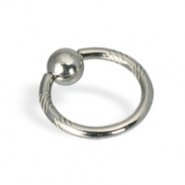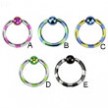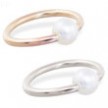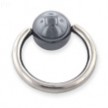Carved captive bead ring, 14 ga
- Gauge (Thickness): 14 (1.6mm)
- Ball size: 3/16" (5mm)
- Material: 316L surgical grade stainless steel
- Type: captive bead ring
Shown: 12mm captive bead ring.
| Click on the picture to see a big picture and description of the body jewelry you are interested in. | |||||||||
|---|---|---|---|---|---|---|---|---|---|
|
Titanium anodized duel-tone striped captive bead...
$6.99
Titanium anodized duel-tone striped captive bead ring, 16 ga
|
Captive Bead Ring with Amethyst Ball,...
$8.99
Captive Bead Ring with Amethyst Ball, 16Ga
|
14K Gold captive bead ring with...
$60.99
14K Gold captive bead ring with Round White Akoya Pearls, Grade AA
|
Hematite ball captive bead ring, 12...
$7.49
Hematite ball captive bead ring, 12 ga
Shown: 14mm captive ring with 8mm ball/ |
||||||
Tools
Most piercers use forceps to clamp the area to be pierced when both entrances of the piercing can be marked. Forceps provide a guide for accurate placement. Forceps commonly used are the Pennington (triangular head) and the Foerster (oval head). The serations on the head of the forceps are sharp and should be filed down to prevent excess irritation. The forceps should be clamped using the tension of a rubberband wrapped around the handles. Clamping the forceps using the teeth on the handles is extremely uncomfortable and can cause bruising. Most piercers use sterilized, disposable cork to support the side opposite the needle and to guard against accidental needle sticks.
Vertical Clitoral Hood, Prince Albert, and some ear cartilage piercings are performed with the aid of a surgical steel needle receiving tube. Septum piercings are usually performed with the aid of a flared needle receiving tube. Nostril piercings are usually performed with a large, angled needle receiving tube.
Method of jewelry insertion depends on the jewelry. In the case of rings the rounded convex end of the ring will fit against the flat hollow end of the needle. Unless a larger gauged needle is used, the ring will not actually fit inside the needle. When inserting rings, contact between the needle and ring must be maintained, or the piercing could be lost.
Externally-threaded jewelry is difficult to safely insert install into a new piercing. The exposed threads can get caught on the inside of the piercing, making insertion painful and difficult. Often contact between the needle and the jewelry cannot be maintained and the piercing is lost. Some externally threaded jewelry is designed so that the threaded section can be inserted into the end of the needle. Otherwise, a needle large enough to accommodate the threaded section should be used to prevent the threads from tearing the piercing.
Internally threaded barbells are best inserted using a thin insertion taper or wire, one end of which is inserted into the barbell, the other end inserted into the needle, which prevents the needle and barbell from slipping apart mid-way during installation.
The jaws of any pliers used to torque open, tighten, or expand rings should be wrapped in surgical tape to prevent the jewelry from being scratched. Brass-jaw pliers have been recommended as the brass is softer than steel and is thus less likely to mar the jewelry.




